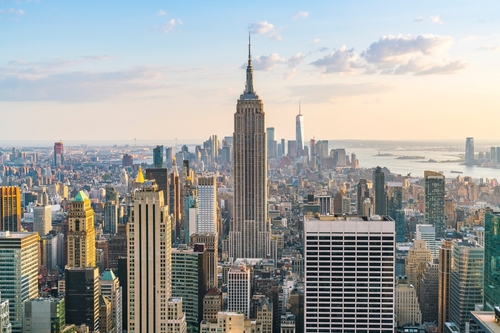
Just weeks after it went into effect, the U.S. Department of Transportation’s Federal Highway Administration terminated its approval of New York City’s cordon pricing plan.
The New York Central Business District Tolling Program (CBDTP) began its pilot program on Jan. 5. In a letter to New York Gov. Kathy Hochul on Wednesday, the FHWA rescinded its Nov. 21, 2024, agreement under the Value Pricing Pilot Program. The move effectively ends tolling authority for New York City’s cordon pricing plan imposing tolls on drivers entering the Manhattan Central Business District.
“New York State’s congestion pricing plan is a slap in the face to working class Americans and small business owners,” U.S. Transportation Secretary Sean P. Duffy said. “Commuters using the highway system to enter New York City have already financed the construction and improvement of these highways through the payment of gas taxes and other taxes. But now the toll program leaves drivers without any free highway alternative, and instead, takes more money from working people to pay for a transit system and not highways… The program also hurts small businesses in New York that rely on customers from New Jersey and Connecticut. Finally, it impedes the flow of commerce into New York by increasing costs for trucks, which in turn could make goods more expensive for consumer.”
FHWA said federal-aid highways as a toll-free highway system has been fundamental to the Federal-aid highway program, except for a few exceptions allowed by Congress. Duffy said in his letter he was terminating the pilot because the scope of the CBDTP is unprecedented and provides no toll-free option for drivers, and that the toll rate was set to raise revenue for transit rather than to reduce congestion. The department said it will work with the project sponsors on its orderly termination.
In response, Hochul said she’d see the department in court.
“Public transit is the lifeblood of New York City and critical to our economic future — as a New Yorker, like President Trump, knows very well,” she said in a statement. “We are a nation of laws, not ruled by a king. The MTA has initiated legal proceedings in the Southern District of New York to preserve this critical program. We’ll see you in court.”
The White House on Monday tweeted out a statement that President Donald Trump had killed congestion pricing, along with a picture of Trump in a crown captioned “Long live the King.”
Hochul said since the plans implementation in January traffic was down but travel on transit was up.
“Since this first-in-the-nation program took effect last month, congestion has dropped dramatically and commuters are getting to work faster than ever,” she said. “Broadway shows are selling out and foot traffic to local businesses is spiking. School buses are getting kids to class on time, and yellow cab trips increased by 10 percent. Transit ridership is up, drivers are having a better experience, and support for this program is growing every day.”
Truckers, however, said they were glad to see congestion pricing go away.
“We commend President Trump and Secretary Duffy for terminating this disastrous tolling scheme,” American Trucking Associations President and CEO Chris Spear said in a statement. “Truckers don’t drive into Manhattan to sightsee. They do it because customers depend on them. The deliveries they make are essential to businesses and residents and keep New York City running. “Truckers deserve our gratitude. Instead, New York imposed a $21.60 toll — eventually climbing to $36 — each time they crossed south of 60th Street. Even worse, the proceeds of this shakedown were not dedicated to improving roads and bridges but rather subsidized a bloated and mismanaged transit bureaucracy that has proven unable to control spiraling costs.”
The toll rates for vehicles are $9 during peak times for passenger vehicles, and $2.25 overnight; $14.40 for small trucks and charter buses during peak times and $3.60 overnight; and $21.60 for large trucks and charter buses during peak times and $5.40 overnight.